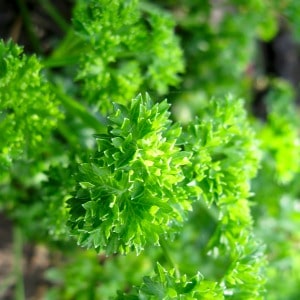If you have a surplus of fresh parsley, freezing it is an excellent way to preserve its flavor and nutritional benefits. Parsley is a versatile herb that can be used in a variety of dishes, from soups and stews to salads and sauces. By freezing parsley, you can ensure that you always have a supply of this tasty herb on hand, even when it’s out of season.
This post may contain affiliate links.
Why Freeze Parsley
If you love using fresh parsley in your cooking, but find it difficult to keep it fresh all year round, then freezing parsley is a great solution. Freezing parsley is a simple and effective way to preserve the flavor and nutrients of fresh parsley for use in your favorite recipes, even during the winter months.
Fresh herbs like parsley are often difficult to preserve for long periods of time. They can wilt and lose their flavor quickly, especially if they are not stored properly. Freezing parsley is a great way to preserve its flavor and nutritional value for later use.
Related Article: How to Freeze Peaches with Fruit Fresh
Here are some reasons why you might want to freeze parsley:
- To preserve fresh parsley for use in your favorite recipes during the winter months when fresh parsley is not readily available.
- To save money by buying fresh parsley in bulk when it’s in season and freezing it for later use.
- To reduce food waste by freezing leftover parsley that you can’t use up before it goes bad.
Related Article: How to Freeze Shredded Zucchini: Easy Tips and Tricks
Freezing parsley is a simple process that can be done in a few easy steps. You can freeze parsley leaves whole or chopped, or you can puree the parsley and freeze it in small containers or ice cube trays. Frozen parsley can be stored in the freezer for up to 6 months.
Preserving parsley by freezing it is an easy and convenient way to enjoy fresh parsley all year round. Whether you’re making soups, stews, salads, or sauces, having frozen parsley on hand is a great way to add flavor and nutrition to your favorite recipes.

Choosing and Preparing the Parsley
Selecting Fresh Parsley
When choosing parsley, look for bright green leaves that are firm and crisp. Avoid any parsley that appears wilted, yellow, or has brown spots. If possible, choose parsley that is still attached to its stems, as this will help keep it fresh for longer.
Washing the Parsley
Before freezing parsley, you need to wash it thoroughly to remove any dirt or debris. To do this, fill a large bowl with cold water and gently swish the parsley around. You can also use a salad spinner to help remove any excess water.
Related Article: How to Freeze Herbs in Butter or Olive Oil
Drying the Parsley
After washing the parsley, it’s important to dry it thoroughly to prevent any ice crystals from forming when you freeze it. You can either use a salad spinner to remove any excess water or lay the parsley out on a clean kitchen towel or paper towel and gently pat it dry.
Once your parsley is clean and dry, you can move on to freezing it. There are several methods you can use to freeze parsley, including chopping it and freezing it in bags, freezing it in ice cube trays, or pureeing it and freezing it in small containers.
Remember, freezing parsley is a great way to preserve this flavorful herb for future use in your favorite recipes. With a little bit of preparation, you can enjoy fresh parsley all year round, even if you don’t have access to a herb garden.
Related Article: How to Blanch Broccoli: A Step-by-Step Guide
Methods of Freezing Parsley
When it comes to preserving parsley, freezing is one of the easiest and most effective methods. Here are three ways to freeze parsley that will keep it fresh and flavorful for months to come.
Freezing Parsley in a Freezer Bag
One of the simplest ways to freeze parsley is to chop it up and store it in a freezer bag. Here’s how to do it:
- Wash the parsley leaves and pat them dry.
- Chop the parsley into small pieces.
- Fill a freezer bag with the chopped parsley, leaving a little bit of space at the top.
- Double-bag the parsley to prevent freezer burn.
- Label the bag with the date and store it in the freezer.
When you’re ready to use the parsley, simply take out the amount you need and return the rest to the freezer.
Related Article: How to Freeze Yogurt: Quick and Easy Guide

Freezing Parsley in Olive Oil
Freezing parsley in olive oil is another great way to preserve it. Here’s how to do it:
- Wash the parsley leaves and pat them dry.
- Chop the parsley into small pieces.
- Fill an ice cube tray with the chopped parsley, leaving a little bit of space at the top.
- Pour olive oil over the parsley until it is just covered.
- Freeze the tray until the parsley is solid.
- Pop the parsley cubes out of the tray and store them in a freezer bag.
- Label the bag with the date and store it in the freezer.
This method is perfect for adding a burst of flavor to soups, stews, and other dishes.
Related Article: How to Freeze Milk: Tips and Tricks for Longer Storage
Freezing Parsley Pesto
If you have a lot of parsley on hand, making parsley pesto and freezing it is a great way to use it up. Here’s how to do it:
- Wash the parsley leaves and pat them dry.
- Add the parsley, garlic, Parmesan cheese, pine nuts, and olive oil to a food processor.
- Pulse until the ingredients are well combined and the pesto is smooth.
- Spoon the pesto into ice cube trays, filling each compartment about halfway.
- Freeze the trays until the pesto is solid.
- Pop the pesto cubes out of the tray and store them in a freezer bag.
- Label the bag with the date and store it in the freezer.
When you’re ready to use the pesto, simply take out the amount you need and thaw it in the fridge. It’s perfect for adding to pasta, sandwiches, and more.
Overall, freezing parsley is a great way to preserve its flavor and nutrients. Whether you choose to chop it up and store it in a freezer bag, freeze it in olive oil, or make parsley pesto, you’ll be able to enjoy fresh parsley all year long.
Related Article: How to Prune Basil
Storing and Using Frozen Parsley
Storing Frozen Parsley
Once you’ve frozen your parsley, you’ll need to store it properly to keep it fresh. Parsley can be stored in an airtight container or plastic bag in the freezer for up to six months. Make sure to label your container or bag with the date so you know when it was frozen.
It’s important to note that moisture can cause freezer burn, so be sure to remove as much air as possible from the container or bag before freezing. You can also use parsley cubes, which are frozen portions of chopped parsley that can be added directly to dishes without thawing.
Related Article: Can You Freeze Meatloaf?
Using Frozen Parsley in Dishes
Frozen parsley can be used in a variety of dishes, including soups, stews, and cooked dishes. It’s also a great garnish for dishes like tomatoes and basil.
When using frozen parsley, keep in mind that the texture may not be the same as fresh parsley. However, the flavor will still be there. You can add frozen parsley directly to dishes without thawing, or you can thaw it in the refrigerator for a few hours before using.
Overall, freezing parsley is a great way to preserve it for later use. Just make sure to store it properly and use it in dishes where the texture won’t be a major factor.
Additional Tips and Warnings
When it comes to freezing parsley, there are a few additional tips and warnings you should keep in mind to ensure that your parsley stays fresh and flavorful.
Firstly, it is important to note that flat-leaf parsley is the best type to freeze. This variety has a stronger flavor and holds up better during the freezing process, making it a great option for cooking and seasoning dishes.
When preparing your parsley for freezing, be sure to remove the stems and only freeze the leaves. The stems can be tough and bitter, and may not freeze well. Additionally, make sure that your parsley is completely dry before freezing it. Any excess moisture can cause ice crystals to form, which can damage the flavor and texture of the parsley.
Related Article: How to Freeze Rhubarb: A Quick and Easy Guide
If you have a large amount of parsley to freeze, consider dividing it into smaller portions. This will make it easier to use as needed, and will also help to prevent freezer burn.
When it comes to storing your frozen parsley, there are a few options to choose from. You can use small covered containers, clean ice cube trays, or even freezer bags. If you choose to use freezer bags, be sure to label them with the date and amount of parsley inside.
It is also important to note that while frozen parsley can be used in cooked dishes, it may not be suitable for use as a garnish or in fresh salads. The freezing process can change the texture and appearance of the parsley, making it less appealing for these types of dishes.
Frequently Asked Questions
What is the best way to freeze fresh parsley?
The best way to freeze fresh parsley is to chop it finely and place it in an ice cube tray. Fill each compartment with water or olive oil to cover the parsley, then freeze. Once frozen, transfer the cubes to a freezer-safe container or bag. This method helps to preserve the flavor and color of the parsley.
Should you wash fresh parsley before freezing?
Yes, it’s important to wash fresh parsley before freezing it. Rinse the parsley under cool running water and pat it dry with a clean towel. This will remove any dirt or debris and help to prevent freezer burn.
Can you freeze parsley straight from the garden?
Yes, you can freeze parsley straight from the garden. Just make sure to wash it thoroughly and let it dry completely before freezing.
How long can you freeze parsley?
You can freeze parsley for up to six months. After that, the flavor and texture may start to deteriorate.
How to defrost parsley?
To defrost parsley, simply remove the frozen cubes from the freezer and let them thaw in the refrigerator or at room temperature. Alternatively, you can add the frozen cubes directly to soups, stews, or other dishes and let them thaw as the dish cooks.
How to use frozen parsley?
Frozen parsley is best used in cooked dishes rather than raw. Add it to soups, stews, sauces, or casseroles for a burst of fresh flavor. You can also blend it with other herbs and spices to make a flavorful seasoning blend.
Related Recipes
- How to Freeze Brussel Sprouts
- Freezing Green Beans
- How to Freeze Bell Peppers
- Freezing Strawberries
- How to Freeze Whole Tomatoes
- How to Blanch Vegetables for Freezing
Follow my canning and preserving board on Pinterest.



My mother in law taught me this method 40 years ago!! Done it ever year since then, using plastic wrap.
This is great! My mom has been doing this for a few years and swears by it! What tools do you use? I know she just uses a spatula to smush the herbs to the bottom of the bag, ziplocks and rubber bands. Anything you’ve found that is helpful? How do you store all the baggies in your freezer? (thinking for a Christmas gift for her 😉 )